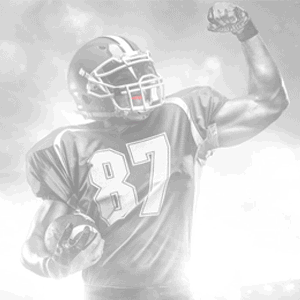It’s Not Just A Clever Name: Mouthguards Guard Mouths

In nearly every sports league across the United States — from pee wee football to high school lacrosse to junior hockey — mouthguards are becoming a mandatory piece of athletic equipment. Yet many athletes at all levels don’t know why they are required to wear them and some even choose to forgo a mouthguard entirely.
And that’s a foolish and potentially dangerous choice.
While those players view mouthguards as an uncomfortable distraction that inhibit their breathing and communication, that’s only true for generic guards. That’s why both the American Dental Association and the Academy of Sports Dentistry recommend a professionally-made, properly-fitted custom mouthguard for all contact and collision sports.
However, no matter what type of mouthguard your players wear, the most important thing is that they actually wear them. Let’s take a look at the reasons why mouthguards are required:
1. Protect The Teeth: Front Impact Edition
In all sports — particularly contact sports — there is always a chance that a player may take a blow to the front of the face; and those hits have major consequences for that player’s teeth.
A direct impact to the front of the face has the ability to damage or knock out a few teeth, leading too expensive, and potentially urgent, dental treatment. While broken or fractured teeth are salvageable, time is of the essence for players who get their tooth completely knocked out of their mouth.
So why wear mouthguards? Simple: they help to protect against that frontal impact by acting as a shock absorber and keeping your players’ teeth intact. Not only does that save your players from serious injury, but from high dental reconstruction bills.
2. Protect The Teeth: Jaw Slamming Edition
When taking a hit in a contact sport, or even simply falling in a non-contact sport, a player’s lower jaw may oftentimes slam into their upper jaw. Similar to a frontal impact, that collision has the ability to damage or knock out teeth.
So why wear mouthguards? Again, mouthguards are meant to absorb that impact by filling the space between the upper and lower jaw, saving the teeth from damage or loss.
3. Protect The Jaw
Mouthguards don’t just protect the teeth. The impact between the upper and lower jaw may also cause severe injuries, such as jaw dislocations, fractures and temporomandibular joint (TMJ) problems.
So why wear mouthguards? Again by absorbing the impact, a mouthguard helps to keep your players’ jaws injury-free.
Bonus: Why Protect The Upper Jaw, Not The Lower?
When a player gets hit in the mouth, the point of impact where the force is felt is the most protruding point of the player’s mouth: the upper teeth. That’s why the recommended professionally-made, properly-fitted custom mouthguards are made for the upper jaw, not the lower. They make the most protruding point even more defined and capable of attracting a hit.
When a mouthguard is designed to fit perfectly and is snug against the upper teeth, it won’t move, meaning it is always in position when it needs to be to absorb impact.
So why wear mouthguards? Because your players’ mouths are worth it! An oral injury is a life long injury with a high cost and requiring frequent check-up visits in order to maintain. It’s just your teeth, and aren’t your teeth just reason enough?
Why do athletes wear mouthguards? It’s simple. Injuries to the teeth and jaw last a lifetime, but are easily avoided simply by wearing the proper mouthguard.






